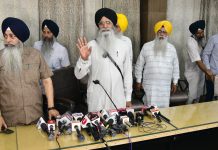
For a country where politics is all-pervasive, there’s precious little to be found in mainstream Indian cinema. When our films do discuss politics, subtlety and nuance are alien concepts, sacrificed easily at the altar of easy questions and answers. Prakash Jha, however, has no fear of complexity. His films over the last two decades have examined the various ways our country has changed, and the decidedly difficult questions those changes ask of who we are.
Satyagraha, Jha’s much-anticipated next film released on August 30, is possibly his most political. But Jha, it can be argued, isn’t a political filmmaker. His films are riddled with political figures who speak in political jargon, but Jha’s area of expertise is human nature. Understanding why we believe in what we do, and what goes into making us who we choose to be.
At one point in the film, Manav (Ajay Devgn) points to a young man, Ravi Kumar, and calls him the future of India. Ravi’s parents, he explains, were labourers who did not want him to go to the ramshackle government school and struggled to pay for a private education. He got a job in a call centre, and wants to take his destiny in his own hands. He doesn’t believe in mai-baap sarkar; he considers himself a client of the government, paying taxes and expecting efficient public services in return. If he doesn’t get those services, he has the right to refuse to pay his taxes.
It’s a characterisation that would make Rousseau roll in his grave. Surely there’s more to citizenship than mere clientelism, more to building a welfare state than giving value for money to the two or three percent of our population who pay income tax. But Jha is a man who’d rather deal with what is than what should be. For all the Leftist handwringing over the demise of empathy in post-liberalisation India, it is a reality that cannot be denied. An aspirational and upwardly-mobile middle class is naturally going to demand efficiency before greater concerns of social justice. “They could be Ravi Kumar,” he says, pointing to the waiters serving us coffee. “They know that if they do not perform, they can be thrown out of the job. So, similarly, they want the people they are paying — that is, the government — to perform. My generation was hugely attached to the State. Depended on it. Lived for it. Aspired towards becoming a part of it. This generation is self-made. The government is its last priority. It has seen, and is bearing the brunt of, the government exiting every institution. So, it’s not loyal to the government, and will naturally approach it as a client.”
“Democracy,” he goes on, “is being renegotiated in this country. I see a new nation-state theory emerging, being born out of the compulsions of young India.” What that theory is, Jha doesn’t know. But he’s fascinated by the way it might play out, by the prospect of a new polity being created through this social churning. “I think it is a tumultuous moment in our history. We are all waiting for it, whatever ‘it’ is, to emerge. I wish there was a Gandhi today. He would have found a way to channel this angst towards some form of political motivation. But I am as clueless as you are about what will happen.”
He is content to observe and analyse, to study the contradictions of human nature without making some sort of pronouncement, or coming to some moral conclusion. His own views don’t factor, or rather they may factor but so do opposing views, so you are never sure which particular set of views is his.
So, in Satyagraha, Manav’s views are not above dispute. In fact, Amitabh Bachchan’s Dwarkanath Anand is the anti-Manav, ranting about a generation of egoists chasing material wealth and not giving a damn about the nation. They eventually reconcile because of a shared personal loss, but throughout the movie continue to stand for very different things. No judgement is passed on either man’s worldview. The film eventually chooses one over the other, but is open-ended enough for two different people to leave the theatre with two very different messages.
We are meeting at Jha’s hotel in the heart of Lutyen’s Delhi, a stone’s throw away from 10, Janpath. Jha is in the capital to promote his film, as well as to release a book about the movie, published by Om Books. It seems subversive to discuss revolution in such manicured environs, in a place so secure in its wealth and influence. The past two years have seen the confidence of our rich and powerful shaken by Anna Hazare’s anti-corruption movement and the tumults that ensued. Much like Raajneeti, Jha’s 2010 film about dynastic politics, was hyped before its release as a biopic of the Gandhi family, most of the pre-release buzz about Satyagraha has centred around the similarities to the story of Anna’s life. It is a charge Jha has refuted every time it’s been put to him. This denial seems disingenuous once you watch the film. Much of Satyagraha’s plot almost identically follows almost entirely the sequence of events in the actual protests; Bachchan’s supporters even wear white Gandhi caps with ‘Jan Satyagraha’ written on them, much like the ubiquitous ‘I Am Anna’ caps from 2011.
Jha is coy about the similarities. It’s not a film about Team Anna, he says; he intended to tell a story of the political milieu of contemporary India. It is, more than anything, a film about anger. The action begins, after all, with Dwarkanath slapping the district magistrate. He is arrested, and Manav attempts to release him by starting a public agitation. The people’s anger, initially manufactured through savvy social networking, soon boils over into a major agitation. The various players attempt to channel that anger to suit their various agendas, until they realise it isn’t something that is within their power to control. The heady feeling of having a mob at their disposal changes the protagonists, alters the course of the movement. There are lessons there for our anti-corruption crusaders. In fact, Yogendra Yadav of the Aam Aadmi Party, who was present at a special screening of the film, told Jha that he wanted his entire party high command to watch it.
Rather than the Anna agitation, Jha looks to the protests in Delhi after last December’s horrifying gang rape as the inspiration behind his film. The “thousands of young Indians assembling day after day, standing up to lathi-charges and water cannons,” was, he feels, the highest point of social unrest in recent Indian history. It is movements like this, leader-less and agenda-less expressions of anger, that Jha sees as the way of the future. “It is what young India has come to epitomise.”
What comes of that anger is, of course, a matter of conjecture. It could be the first step in a major revolution. It could remain a battle of attrition, where the political class stares down every outburst without compromise. It could simply fizzle out. It could lead to the rise of another Gandhi. It could also lead to another Hitler, capitalising on anger and fear to grab power. Whatever happens, however, one can be fairly certain that Prakash Jha will be there, watching, learning, taking notes. Probably with a film crew on hand.
ajachi@tehelka.com













